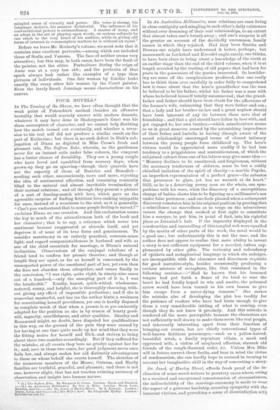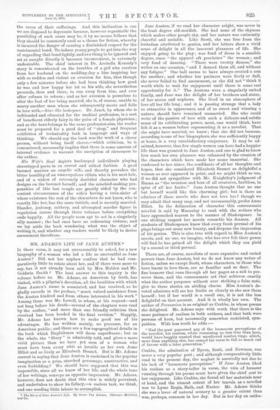FOUR NOVELS.*
IN The Taming of the Shrew, we have often thought that the weak point of Petruchio's method (besides an offensive
brutality that would scarcely answer with modern damsels, whatever it may have done in Shakespeare's time) was his sham assumption of character, and we cannot help doubting how the match turned out eventually, and whether a rever- sion to his real self did not produce a similar result on the part of Katherine ; but there is no such defect in Dick's sub- jugation of Diana as depicted in Miss Cross's fresh and
pleasant tale, The Saffron Robe, wherein, as the gentleman never for an instant sails under false colours, the conquest has a better chance of durability. They are a young couple who have loved and squabbled from nursery days; when grown-up they go on sparring—though their quarrels have not the asperity of those of Beatrice and Benedick- needing each other, unconsciously, more and more, rejecting the idea of sentimental affection, and remaining comically bliud to the natural and almost inevitable termination of their mutual relations ; and all through they present a picture of a sort of fencing-match with love, which gave us the agreeable surprise of finding fictitious love-making enjoyable for once, instead of a weariness to the soul, as it is generally. "Can't you understand that to some people feeling is sacred?" exclaims Diana on one occasion. And this exclamation seems the key to much of the attractiveness both of the book and her character ; that is to say, a reticence which never lets sentiment become exaggerated or obtrude itself, and yet deprives it of none of its true force and genuineness. To consider matrimony in an entirely practical, common-sense light, and regard companionableness in husband and wife as one of the chief essentials for marriage, is Diana's natural inclination. Observations of the conjugal relations of a friend tend to confirm her prosaic theories; and though at length they are upset, as far as herself is concerned, by the unsuspected power of the emotional part of her, yet even then she does not abandon them altogether, and cornea finally to the conclusion, "I was right, quite right, in ninety-nine cases out of a hundred,—only the annoying part of it is, I was the hundredth." Kindly, honest, quick-witted, wholesome- natured, sunny, and helpful, she is thoroughly charming, with- out giving any effect of impossible perfection ; and if she is somewhat masterful, and has (as the author hints) a weakness for constituting herself providence, yet one is hardly disposed to complain much of that when a person is so pre-eminently adapted for the position as she is by reason of hearty good- will, sagacity, unselfishness, and other qualities. Stanley and Rosamund might, no doubt, have disputed her qualifications in this way, on the ground of the pain they were caused by her having at one time quite made up her mind that they were the fitting mates for herself and Dick, and striven to bring about these two matches accordingly. But if they suffered for the mistake, at all events they bore no grudge against her for it ; and, save in these two cases, her good judgment never once fails her, and always makes her aid distinctly advantageous to those on whose behalf she exerts herself. The sketches of the numerous members of the Moore, Outram, and Hardy families are truthful, graceful, and pleasant; and there is not one, however slight, that has not touches evincing accuracy of observation and insight into human nature.
• (1.) The Saffron Robe, By Margaret B. Cross. London ; Hurst and Blackett. —12.) An Australian 3/illionaire. By Mrs, A. Blitz. Landon : Ward, Lock, Bowden, and Co,—(8.) Dr. Janet, of Harley Btreet. By A. Kenoaly. London : Digbv, Long, and 0o,—(44 Kis Wila's Soul, By Pitzgerald Molloy. London
ltelupson and Co. •
In An Australian Millionaire, near relations are seen living in close contiguity and mingling in each other's daily existences without ever dreaming of their real relationships, to an extent that almost takes one's breath away ; and one's surprise is all the greater on account of the decidedly uncommon family names in which they rejoiced. Had they been Smiths and Browns one might have understood it better, perhaps ; but names such as Lockstud and Kovodel ought surely, one thinks, to have been clues to bring about a knowledge of the truth at an earlier stage than the end of the third volume, when it is at length revealed by the reading of old papers that had been for years in the possession of the parties interested. So bewilder- ing are some of the complications produced, that one really has to think them over carefully in order fully to comprehend how it came about that the hero's grandfather was the man he believed to be his father, whilst his father was a man with whom he believed himself totally unconnected; that the grand- father and father should have been rivals for the affections of the former's wife, unknowing that they were father and son ; that a lady and her brother-in-law and a great nephew should have been ignorant of any tie between them save that of friendship ; and that a girl should have fallen in love with, and got engaged to, her own brother,—which misadventure seems to us in great measure caused by the astonishing imprudence of their father and Isabella in having (though aware of the secret relationship) encouraged terms of closest intimacy between the young people from childhood up. The hero's virtues would be appreciated more readily if he bad less tendency to a priggishness and sententiousness, of which the subjoined extract from one of his letters may give some idea :— "Memory declines to be smothered, and forgiveness, without the necessary tenderness of oblivion, must be but a coldly chiselled imitation of the spirit of charity—a marble Psyche, an imperfect representation of a perfect grace—the asbestos that presumes to glow, yet has no warmth at its heart." Still, as be is a deserving young man on the whole, one Byrn- pathisea with his woes, when the discovery of a surreptitious change of babies shows him to be figuring as a millionaire's son under false pretences ; and one feels pleased when a subsequent discovery reinstates him in his original position by proving that a coincidence (so marvellous as to verge on the miraculous) causes the change that seethed at first sight to constitute him a usurper, to put him, in point of fact, into hia rightful place as Jeremiah's heir. If the ingenuity displayed in the construction and unravelling of this tangled web were equalled by the merits of other parts of the work, the novel would be a good one ; but unfortunately this is not the case, and the author does not appear to realise that mere ability to invent a story is not sufficient equipment for a novelist, unless sup- plemented by other gifts. The verbosity and redundancy of epithets and metaphorical language in which she indulges, are incompatible with the clearness and directness requisite for good narrative-style, besides occasionally producing a curious mixture of metaphors, like that contained in the following sentence :—" Had he known that his loosened tongue had put forth a flame of its kind to sear the heart be had fondly hoped to win and soothe, the poisoned arrow would have been turned to his own bosom to give him escape from a never-dying remorse." She makes the mistake also of developing the plot too tardily for the patience of readers who have had hints enough to give them a very considerable inkling of what is coming, even though they do not know it precisely. And this mistake is rendered all the more perceptible because the characters are not sufficiently well drawn to make them seem like real people, and inherently interesting apart from their function of bringing-out events, but are chiefly conventional types of well-known fictitious personages,—such as a yellow-haired, beautiful witch, a finally repentant villain, a meek and oppressed wife, a victim of misplaced affection, staunch old friends of the rough-diamond order, &c. Unless Mrs. Blitz will in future correct these faults, and bear in mind the virtue of condensation, she can hardly hope to succeed in turning to account her imaginative skill in the way of concocting a story.
Dr. Janet, of Harley Street, affords fresh proof of the in- clination of some novel-writers to pourtray cases where, owing to a strained and exceptional concatenation of circumstances, the indissolubility of the marriage-ceremony is made to wear the aspect of a grievous hardship, arousing sympathy with the innocent *flips, and provoking a sense of clissetiefar914ou witle the cause of their sufferings. And this inclination is one we are disposed to deprecate because, however regrettable the possibility of such cases may be, it by no means follows that they should be commonly used as a theme for fiction, whereby is incurred the danger of causing a diminished respect for the matrimonial bond. To induce young people to get into the way of regarding that bond lightly, and as a thing to be ignored and set at naught directly it becomes inconvenient, is extremely undesirable. The chief interest in Dr. Arabella Kenealy's story is concentrated on the troubles of a girl who receives from her husband on the wedding-day a kiss inspiring her with so sudden and violent an aversion for him, that though only a few minutes before she had been thinking how good he was and how happy her lot as his wife, she nevertheless proceeds, then and there, to run away from him, and ever after refuses to return ; and as her aversion is powerless to alter the fact of her being married, she is, of course, unable to marry another man whom she subsequently meets and falls in love with,—hinc 'Wm /achrytnte. Dr. Janet, by whom she is befriended and educated for the medical profession, is a sort of beneficent elderly fairy in the guise of a female physician ; and as the hero belongs to the same profession also, the reader must be prepared for a good deal of " shop," and frequent exhibition of technicality both in language and ways of thinking. We should say the book was the work of a clever person, without being itself clever,—which criticism, be it remembered, necessarily implies that there is some amount of internal evidence to warrant the ascription of cleverness to the author.
His Wife's Soul depicts hackneyed individuals playing stereotyped parts in an unreal and stilted fashion. A good baronet marries an angelic wife, and thereby provokes the bitter hostility of an unscrupulous villain who is his next heir, and of a widow of extremely doubtful character who had designs on the baronet herself; and the mischief-making pro- pensities of this last couple are greatly aided by the con- venient circumstance of the wife's having a twin-sister of whose existence the rest of the characters do not know, who is exactly like her, has the same initials, and is secretly married. Slander, jealousy, robbery, and attempted murder figure in regulation course through three volumes before everything ends happily. All the people seem apt to act in a singularly silly manner ; the bad ones have no redeeming virtues; and we lay aside the book wondering what was the object of writing it, and whether any readers would be likely to derive amusement therefrom.



















































 Previous page
Previous page